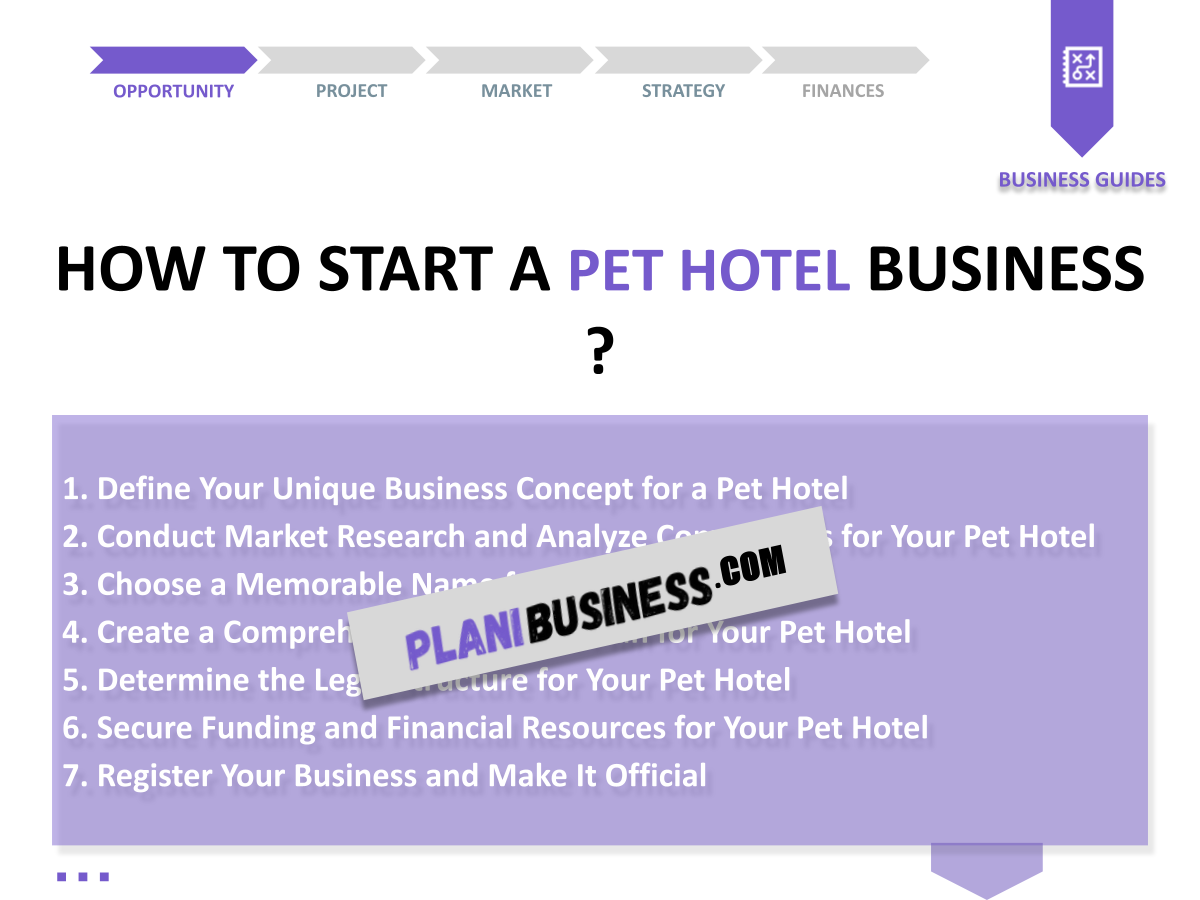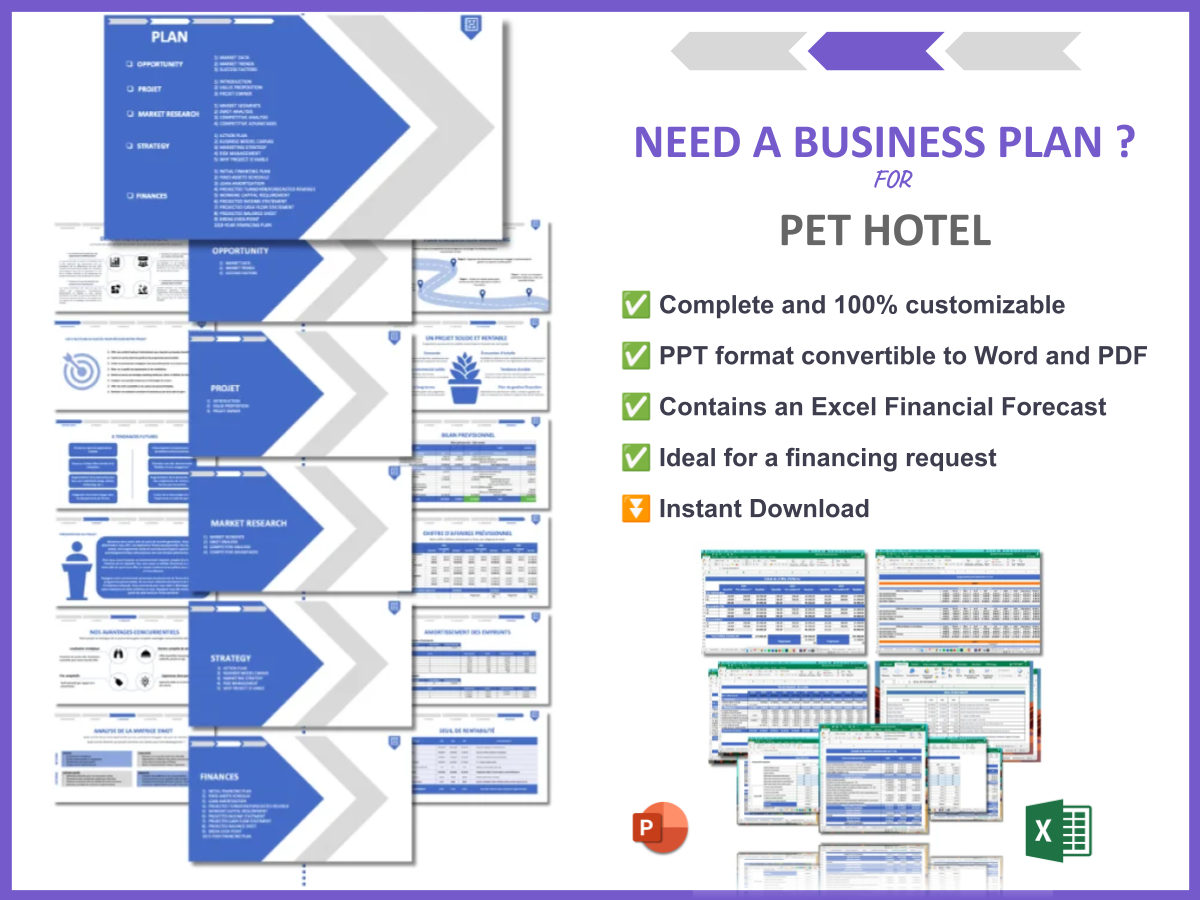Are you thinking about starting a pet hotel? You’re not alone! The pet care industry has been booming, with over 60% of households owning pets. This trend creates a huge opportunity for aspiring entrepreneurs like you. A pet hotel offers a unique and lucrative business model, providing a safe and fun environment for pets when their owners are away. In this article, we’ll guide you through the essential steps on how to start a pet hotel, from developing your business idea to marketing your services. Here’s what we’ll cover:
- Identifying your target market and niche
- Creating a comprehensive business plan
- Understanding legal requirements and permits
- Setting up your facilities and services
- Marketing strategies to attract clients
- Building a passionate team to help you succeed
1. Define Your Unique Business Concept for a Pet Hotel
To kick things off, you need to define what makes your pet hotel stand out. Will you specialize in luxury services, or focus on budget-friendly options? This step is crucial because a unique concept will not only attract customers but also set you apart from competitors.
Take a moment to brainstorm ideas:
- Will you offer pet grooming services?
- How about interactive play areas and activities for pets?
- Will you cater to specialized diets and care for pets with specific needs?
Identifying your niche will help you attract the right clientele. For example, if you decide to focus on luxury services, you might include spa treatments or gourmet meals. On the other hand, a budget-friendly option might emphasize affordability and convenience. Whatever you choose, make sure it reflects your passion for animals.
2. Conduct Market Research and Analyze Competitors for Your Pet Hotel
Understanding the market landscape is crucial when starting your pet hotel. By conducting thorough market research, you can gain insights into existing services and identify opportunities for your business. Here are some steps to help you analyze your competitors:
- Identify existing pet hotels in your area.
- Analyze their offerings, pricing, and customer reviews.
- Determine what makes them successful and where they may fall short.
Creating a comparison table can be a helpful way to visualize this information:
| Competitor | Services Offered | Price Range |
|---|---|---|
| Pet Haven | Luxury suites, grooming, training | $50-$100/night |
| Paws & Claws Inn | Basic boarding, playtime, group activities | $30-$60/night |
This analysis will help you identify gaps in the market that you can fill. For example, if you notice that most competitors do not offer specialized care for senior pets, this could be a niche you could explore. Remember, the more informed you are about your competitors, the better equipped you’ll be to create a business that stands out!
3. Choose a Memorable Name for Your Pet Hotel
Your pet hotel name should be catchy and reflect your brand. A great name not only grabs attention but also conveys the essence of your services. Here are some tips to help you choose the perfect name:
- Keep it simple and easy to remember: You want potential clients to recall your name without effort.
- Include words related to pets or care: This can immediately signal to customers what your business is about.
- Check for domain availability: Make sure the name can also be used as a website URL to establish an online presence.
Once you have a list of potential names, test them out on friends or family to see which ones resonate the most. A memorable name can significantly impact your marketing efforts and brand recognition in the long run!
4. Create a Comprehensive Business Plan for Your Pet Hotel
Creating a detailed business plan is essential for your success. This document serves as your roadmap, outlining your vision, goals, and financial projections. I recommend checking out this business plan template for Pet Hotel. It’s super detailed and can save you a ton of time!
Here are key sections you should include in your business plan:
- Executive Summary: A brief overview of your pet hotel concept, including mission and vision.
- Market Analysis: Insights from your market research and competitor analysis.
- Marketing Strategy: How you plan to attract and retain customers.
- Financial Plan: Detailed projections for startup costs, operating expenses, and expected revenue.
Additionally, consider creating a financial projection table to help visualize your expected earnings and expenses:
| Item | Estimated Cost/Revenue |
|---|---|
| Startup Costs | $20,000 |
| Monthly Operating Costs | $3,000 |
| Projected Monthly Revenue | $5,000 |
Having a solid business plan will not only guide your decisions but also help attract potential investors or lenders. Remember, a well-thought-out plan is a key ingredient to successfully launching your pet hotel!
5. Determine the Legal Structure for Your Pet Hotel
Choosing the right legal structure for your pet hotel is crucial for liability and tax purposes. The legal structure you select will affect your taxes, your personal liability, and how you can raise money. Here are some common options to consider:
- Sole Proprietorship: The simplest structure, where you are the sole owner. However, this means you have unlimited personal liability.
- Limited Liability Company (LLC): Offers personal liability protection while allowing you to benefit from pass-through taxation. This is a popular choice for small businesses.
- Corporation: A more complex structure that provides liability protection but involves more regulations and taxes.
Here’s a comparison table of these legal structures:
| Legal Structure | Pros | Cons |
|---|---|---|
| Sole Proprietorship | Easy to set up and operate | Unlimited personal liability |
| LLC | Limited liability protection, flexible taxation | More paperwork and fees |
| Corporation | Limited liability, easier to raise capital | Complex regulations and higher taxes |
Consider consulting a legal expert or an accountant to help you make the best choice based on your specific situation and goals for your pet hotel.
6. Secure Funding and Financial Resources for Your Pet Hotel
Starting a pet hotel requires capital, and securing funding is one of the most critical steps in your business journey. Here are some options to consider when looking for financial resources:
- Personal Savings: If you have savings, this can be a straightforward way to fund your startup costs without incurring debt.
- Small Business Loans: Many banks and credit unions offer loans specifically for small businesses. Prepare your business plan to present to potential lenders.
- Investors: If you’re open to giving away a share of your business, consider seeking investors who are passionate about pets and interested in your concept.
Additionally, consider alternative funding methods like crowdfunding platforms where you can pitch your pet hotel idea and gain support from pet lovers worldwide.
To help visualize your funding needs, create a table of estimated startup costs:
| Item | Estimated Cost |
|---|---|
| Facility Lease | $1,500/month |
| Equipment and Supplies | $5,000 |
| Marketing Expenses | $2,000 |
| Insurance | $1,200/year |
Having a clear understanding of your funding needs will not only help you secure financing but also manage your cash flow effectively as you launch your pet hotel.
7. Register Your Business and Make It Official
Once you have your business plan and legal structure in place, it’s time to register your pet hotel. This step is crucial to making your business official and ensuring you can operate legally. Here’s how to go about it:
- Choose a Business Name: Your name should reflect your brand and be unique. Conduct a search to ensure it’s not already in use.
- File Necessary Paperwork: Depending on your legal structure, you may need to file articles of incorporation or organization with your state.
- Obtain a Federal Employer Identification Number (EIN): This is required for tax purposes and can usually be obtained online through the IRS website.
Additionally, consider creating a timeline for your registration process. This will help you stay organized and ensure you complete each step on time. Here’s a quick checklist:
- Decide on a business name
- Register your business with the state
- Apply for an EIN
- Set up a business bank account
By taking these steps, you’ll lay a strong foundation for your pet hotel and ensure you comply with all legal requirements.
8. Obtain Necessary Permits and Licenses for Your Pet Hotel
Before you can open the doors to your pet hotel, you’ll need to obtain the necessary permits and licenses. This step is crucial to ensure you meet local regulations and provide a safe environment for pets. Here’s what to consider:
- Business Licenses: Most states require businesses to have a general business license. Check with your local government to see what is needed.
- Health and Safety Permits: Since you’ll be caring for animals, you may need to meet specific health and safety regulations. This could involve inspections by local health departments.
- Animal Care Permits: Some jurisdictions require special permits for businesses that handle animals. Research your local laws to ensure compliance.
It’s a good idea to create a list of all the permits you’ll need and the application processes involved. Here’s a sample list to help you get started:
| Permit/License | Required By | Notes |
|---|---|---|
| Business License | City/County | Check local requirements |
| Health Permit | Local Health Department | May require inspection |
| Animal Care Permit | State/Local | Verify specific regulations |
Obtaining these permits is vital for the successful operation of your pet hotel. Ensure you have all your paperwork in order before opening to avoid any legal issues down the road.
9. Set Up Your Financial Management Systems for Your Pet Hotel
Establishing a reliable financial management system is key to your business success. As a new owner of a pet hotel, you’ll want to keep a close eye on your finances to ensure profitability and sustainability. Here are some essential components to consider:
- Budgeting: Create a detailed budget that outlines your expected income and expenses. This will help you manage your cash flow effectively.
- Tracking Expenses and Revenues: Use accounting software or spreadsheets to track your daily expenses and revenues. This will help you identify trends and make informed decisions.
- Regular Financial Reporting: Set up a schedule for generating financial reports, such as profit and loss statements, to monitor your financial health.
To further clarify your financial planning, consider creating a simple financial tracking table:
| Month | Projected Revenue | Projected Expenses |
|---|---|---|
| January | $5,000 | $3,000 |
| February | $6,000 | $3,200 |
| March | $7,500 | $3,500 |
Having a clear understanding of your finances will not only help you secure funding but also manage your cash flow effectively as you launch your pet hotel. Remember, financial management is an ongoing process that will require your attention and adjustment as your business grows.
10. Establish Your Brand Identity for Your Pet Hotel
Your brand identity is the face of your pet hotel and plays a crucial role in attracting and retaining customers. A strong brand helps create a connection with pet owners, making them feel confident in your services. Here are some key elements to consider when establishing your brand identity:
- Design a Memorable Logo: A well-designed logo can convey your brand’s personality and values. Consider hiring a professional designer to create a logo that resonates with pet owners.
- Create a Consistent Visual Style: Use a consistent color scheme, typography, and imagery across all your marketing materials, from your website to your business cards.
- Develop a Tagline: A catchy tagline can communicate what your pet hotel stands for. Make it memorable and reflective of your brand values.
Additionally, consider conducting a brand identity workshop where you can brainstorm ideas and gather feedback from friends, family, or potential customers. This collaborative effort can lead to a brand identity that truly represents your vision and mission.
Remember, your brand is more than just a name and logo; it’s the overall perception that customers have about your pet hotel. Building a strong brand identity will help you stand out in a competitive market and create lasting relationships with your clients.
11. Develop a Professional Website for Your Pet Hotel
Your website is your digital storefront and a crucial tool for attracting clients to your pet hotel. A well-designed website can help you showcase your services, provide important information, and facilitate bookings. Here are some key elements to include:
- Online Booking System: Implement an easy-to-use online booking system that allows pet owners to reserve spots for their pets quickly.
- Service Descriptions: Clearly outline the services you offer, such as boarding, grooming, and training, along with pricing information.
- Contact Information: Make sure your contact information is easily accessible. Include a phone number, email address, and physical location.
Additionally, consider including a blog section on your website where you can share tips, pet care advice, and news about your pet hotel. This not only helps engage visitors but also improves your search engine optimization (SEO) by providing fresh content.
To enhance user experience, ensure your website is mobile-friendly, as many pet owners will likely search for services on their phones. A professional website can help you build credibility and attract more clients.
12. Market and Advertise Your Pet Hotel Effectively
Now that you have your pet hotel set up, it’s time to spread the word! Effective marketing strategies are essential to attract customers and build your brand. Here are some strategies to consider:
- Social Media Advertising: Utilize platforms like Facebook and Instagram to showcase your facilities, share customer testimonials, and run targeted ads.
- Local Pet Events: Participate in local pet events, fairs, or festivals to promote your services and network with potential clients.
- Email Marketing Campaigns: Build an email list and send out newsletters featuring promotions, tips, and updates about your pet hotel.
Additionally, consider collaborating with local pet stores or veterinarians to create referral programs. Offering discounts or incentives can encourage them to recommend your services to their clients.
To track the effectiveness of your marketing efforts, consider creating a table to monitor different channels and their performance:
| Marketing Channel | Cost | Leads Generated |
|---|---|---|
| Social Media Ads | $200/month | 50 |
| Local Pet Events | $150/event | 30 |
| Email Campaigns | $50/month | 20 |
Regularly reviewing your marketing efforts will help you adjust your strategies for better results and increased customer engagement.
13. Assemble a Passionate Team for Your Pet Hotel
Hiring the right team is crucial for providing excellent service at your pet hotel. Look for individuals who share your passion for animals and have experience in pet care. Here are some tips for assembling your team:
- Define Roles Clearly: Determine the positions you need to fill, such as kennel attendants, groomers, and customer service representatives.
- Conduct Thorough Interviews: Look for candidates who not only have experience but also a genuine love for pets. Ask about their previous experience with animals.
- Invest in Training: Provide training to ensure your team meets your standards for pet care and customer service.
Additionally, consider creating a team culture that values collaboration and communication. Encourage team members to share ideas and feedback, as this can lead to a positive work environment and improved service quality.
Ultimately, a dedicated and passionate team will help you create a welcoming atmosphere for pets and their owners, setting your pet hotel up for success.
Conclusion
Starting a pet hotel can be an incredibly rewarding venture, combining your passion for animals with a profitable business model. By following the steps outlined in this article—from defining your unique concept to assembling a dedicated team—you’ll be well on your way to creating a successful establishment. Remember to invest time in market research, develop a solid business plan, and effectively market your services to attract clients.
As you move forward, consider exploring additional resources to enhance your knowledge and strategies. For instance, check out our article on how to create a SWOT Analysis for Pet Hotel to better understand your business landscape. Additionally, our guide on How to Launch a Pet Hotel Marketing Plan? With Example can provide valuable insights into promoting your services effectively. With the right planning and execution, your pet hotel can thrive in this booming industry!
FAQ
1. What are the initial costs to start a pet hotel?
The initial costs for starting a pet hotel can vary widely depending on your location and the scale of your operation. Typical expenses include leasing a facility, renovations, equipment, licenses, insurance, and marketing. On average, you might expect to invest anywhere from $20,000 to $100,000.
2. How do I find the right location for my pet hotel?
Finding the right location involves researching areas with a high density of pet owners. Look for neighborhoods with limited competition, good visibility, and accessibility. Proximity to parks or pet-friendly areas can also be beneficial.
3. What services should I offer at my pet hotel?
Common services include overnight boarding, grooming, training, daycare, and specialized care for pets with unique needs. Consider offering additional services like pet spa treatments or playtime activities to attract more clients.
4. How can I ensure the safety and well-being of pets in my care?
To ensure safety, implement strict protocols for cleanliness, emergency procedures, and pet handling. Staff training is essential, as well as regular health checks for the animals in your care.
5. What licenses and permits do I need to operate a pet hotel?
Licenses and permits vary by location but typically include a business license, health permits, and animal care permits. Check with your local government for specific requirements.
6. How do I market my pet hotel?
Effective marketing strategies include creating a professional website, utilizing social media, participating in local events, and developing partnerships with pet-related businesses. Email marketing can also help keep your clients informed about promotions and services.
7. How do I manage finances for my pet hotel?
Set up a robust financial management system that includes budgeting, tracking expenses and revenues, and generating regular financial reports. This will help you monitor your cash flow and profitability.
8. What should I look for when hiring staff?
Look for candidates who have experience in pet care, a genuine passion for animals, and excellent customer service skills. Conduct thorough interviews and provide training to ensure they meet your standards.
9. How can I create a positive experience for both pets and their owners?
Focus on creating a welcoming environment, providing excellent customer service, and maintaining clear communication with pet owners. Offering personalized care and regular updates can enhance the experience for both pets and their owners.
10. What trends should I be aware of in the pet care industry?
Stay informed about trends such as eco-friendly products, technology integration (like pet cameras), and increased demand for specialized services. Adapting to these trends can help keep your pet hotel competitive and relevant.







